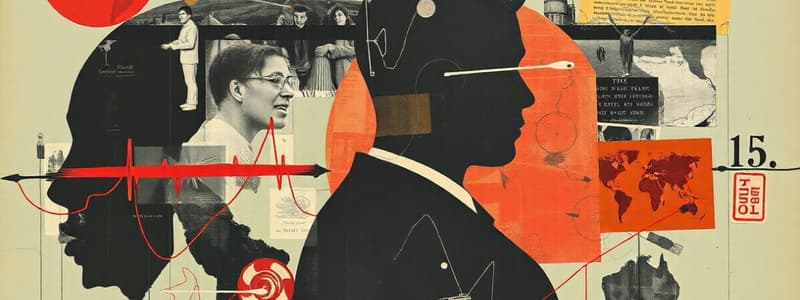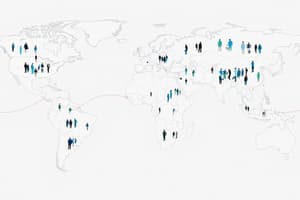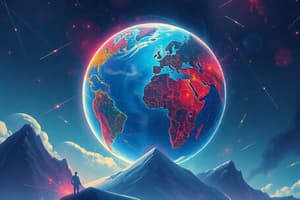Podcast
Questions and Answers
What does cosmopolitanism emphasize regarding individuals?
What does cosmopolitanism emphasize regarding individuals?
- Individuals should focus on cultural relativism.
- Individuals have obligations limited to their national boundaries.
- Individuals are global citizens with obligations that transcend national boundaries. (correct)
- Individuals are primarily concerned with local issues.
Which concept suggests that wealthy nations exploit developing countries?
Which concept suggests that wealthy nations exploit developing countries?
- Marxism (correct)
- Neoliberalism
- Cultural Relativism
- Pragmatism
How does environmentalism advocate for addressing global challenges?
How does environmentalism advocate for addressing global challenges?
- By reinforcing a Western-centric worldview.
- By emphasizing interconnectedness and global cooperation. (correct)
- By supporting cultural homogenization.
- By promoting local solutions that disregard global cooperation.
What does technological determinism highlight in relation to globalization?
What does technological determinism highlight in relation to globalization?
What is the primary focus of market integration?
What is the primary focus of market integration?
What was a key purpose of the Bretton Woods System established after WWII?
What was a key purpose of the Bretton Woods System established after WWII?
Which of the following best describes a global corporation?
Which of the following best describes a global corporation?
What major organization replaced GATT to promote deeper trade integration?
What major organization replaced GATT to promote deeper trade integration?
Which of the following is a characteristic of the global interstate system?
Which of the following is a characteristic of the global interstate system?
How do global corporations influence international relations?
How do global corporations influence international relations?
How does the global interstate system affect global corporations?
How does the global interstate system affect global corporations?
Which of the following is NOT an example of an international organization?
Which of the following is NOT an example of an international organization?
What role did the Marshall Plan play in post-WWII recovery?
What role did the Marshall Plan play in post-WWII recovery?
What role does the U.S. play in NATO concerning Europe?
What role does the U.S. play in NATO concerning Europe?
Which of the following is an economic influence the U.S. has on Europe?
Which of the following is an economic influence the U.S. has on Europe?
What does the North-South divide primarily signify?
What does the North-South divide primarily signify?
According to the North-South divide, which statement accurately describes the Global North?
According to the North-South divide, which statement accurately describes the Global North?
What aspect represents the fluidity of the North-South divide?
What aspect represents the fluidity of the North-South divide?
Which term encapsulates Martin Lewis’s critique of the 'Three Worlds Theory'?
Which term encapsulates Martin Lewis’s critique of the 'Three Worlds Theory'?
Which of the following is a characteristic of First World countries as defined in the 'Three Worlds Theory'?
Which of the following is a characteristic of First World countries as defined in the 'Three Worlds Theory'?
In what way does the U.S. influence Asian countries economically?
In what way does the U.S. influence Asian countries economically?
What is the primary function of the printing press?
What is the primary function of the printing press?
How does electronic media differ from digital media?
How does electronic media differ from digital media?
What is global integration primarily concerned with?
What is global integration primarily concerned with?
Which perspective of global culture emphasizes the mixing of local and global cultures?
Which perspective of global culture emphasizes the mixing of local and global cultures?
What defines a global product?
What defines a global product?
What does globalization of religion entail?
What does globalization of religion entail?
Which of the following is NOT a characteristic of cultural differentialism?
Which of the following is NOT a characteristic of cultural differentialism?
How has digital media impacted cultural life?
How has digital media impacted cultural life?
What key role does the UN General Assembly play in international peace and security?
What key role does the UN General Assembly play in international peace and security?
What is the stance of John Herz regarding the relevance of the state in the context of nuclear threats?
What is the stance of John Herz regarding the relevance of the state in the context of nuclear threats?
Which of the following points did Bokova suggest to address challenges in global governance?
Which of the following points did Bokova suggest to address challenges in global governance?
What is the makeup of the UN Security Council in terms of its membership?
What is the makeup of the UN Security Council in terms of its membership?
What does Johan Galtung predict about the state in relation to individual identities?
What does Johan Galtung predict about the state in relation to individual identities?
What does the concept of 'American Imperium' refer to?
What does the concept of 'American Imperium' refer to?
Why is innovation and reform important for the UN?
Why is innovation and reform important for the UN?
What are the three strategies suggested to tackle global challenges?
What are the three strategies suggested to tackle global challenges?
Flashcards are hidden until you start studying
Study Notes
Cosmopolitanism
- Promotes the idea of individuals as global citizens
- Advocates for obligations transcending national boundaries
Marxism
- Linked to capitalist imperialism
- Wealthy nations exploit developing countries
- This leads to inequality and concentration of wealth in multinational corporations.
Postcolonialism
- Reinforces a Western-centric perspective
- Marginalizes voices and identities from non-Western cultures
Environmentalism
- Emphasizes interconnectedness of ecosystems
- Calls for global cooperation to address environmental challenges like climate change, deforestation, and resource depletion
Cultural Relativism
- Cautions against imposing universal values or a single global culture
- Advocates for protecting local traditions, languages, and customs
Technological Determinism
- Technology drives globalization
- Shortens distances, creates instant communication, enables global markets
Pragmatism
- Global problems need flexible, cooperative solutions
- Solutions are based on shared interests and outcomes
Global Economy
- International exchange of goods and services
- Distinct from the international economy
- Examples: trade, finance, technology
World Economy
- Aggregate of national economies
- Human economic activities assessed in monetary terms
- Includes legal and illegal markets
Market Integration
- Prices across locations or related goods move together over time
- Proportional price movement across different markets
Collapse of the Gold Standard
- Post-WWII: Bretton Woods System (1944-1971) established
- Created IMF and World Bank to stabilize global finance
- GATT established to promote trade
- Marshall Plan helped European recovery and development
Rise of Neoliberalism and Technology
- Neoliberal reforms (deregulation, liberalization) led to rapid growth in trade
- Tech advances (computers, communication) boosted integration
- WTO replaced GATT, promoting deeper trade integration
- Financial crises and trade imbalances continue to challenge stability
Global Corporations
- Operate in multiple countries with significant investments and facilities
- Lack dominant headquarters, decentralized nature
- Examples include Apple, Toyota, Nestle
Global Interstate System
- Network of relationships between countries
- Interconnectedness of states
- Complex web with competing and allied states
- Dynamic nature of alliances and conflicts
- International organizations play a role (e.g., UN, WTO)
- Examples of international relationships: NATO, BRICS
Global Corporations and the Global Interstate System
- Global corporations can influence international relations
- Influence through economic power, lobbying, and global supply chains
- Impact political decisions
- International regulations and treaties affect global corporations
- Trade agreements, sanctions, and human rights considerations influence corporate behavior
The UN General Assembly
- Established in 1945 under the UN Charter
- Chief deliberative body for addressing international issues, maintaining peace and security
- Discusses international peace but makes recommendations if security Council already addressed it
- Makes recommendations for peaceful settlement of situations that might impair friendly relations
- Elects new members to the Security Council
- 15 Members (5 permanent, 10 non-permanent)
Challenges of Global Government in the 21st Century
- New technologies created new pathways for the international community but also caused climate change, poverty, etc.
- To address these challenges:
- Openness of mind
- Build resilience
- Peace building
Relevance of the State Amidst Globalization
- John Herz argued in 1957 that the state would be irrelevant due to its inability to defend against nuclear attack.
- Johan Galtung predicted its disappearance as individuals developed identities
- State legitimacy lies in its effectiveness in providing public goods, not in handling globalization
American Imperium
- U.S. influence globally, territorial and non-territorial
- Overview of world politics since the Cold War
- Peter J. Katzenstein argued that regions are central in global politics
- Contrast with views on nation-state persistence and globalization
Nation-State Persistence
- Nation-state: individual countries with their own governments
- Despite global changes, nation-states are still central in global politics
Regional Dynamics in Europe and Asia
- Technology, security, and culture shape relationships between Europe, Asia, and the U.S.
- Connections between the U.S., Germany, and Japan link America to Europe and Asia.
- Economic, security, and diplomatic ties exist between these regions.
Impacts of the American Imperium on Europe and Asia
- Security and Defense:
- U.S. military protection through NATO in Europe (e.g., responding to Russian threats)
- U.S.-Japan security agreements in Asia address regional threats (e.g., North Korea)
- Economic Influence:
- U.S. investments (e.g., tech firms) shape European economies
- U.S. is a key trading partner with Asia, particularly with China, influencing trade policies
- Cultural Impact:
- U.S. media (e.g., Hollywood) influences European entertainment preferences
- American brands and media (e.g., Apple, Netflix) shape Asian consumer culture
- Political Influence:
- U.S. leads diplomatic efforts in Europe (e.g., sanctions on Russia after Crimean annexation)
- U.S. involved in South China Sea disputes, promoting stability and supporting allies
North-South Divide
- Socioeconomic and political division
- Global North: Wealthier, more developed regions (e.g., U.S., Canada, Europe, Australia)
- Global South: Poorer, less developed regions (e.g., Africa, Latin America, developing Asia)
- Economic Disparities:
- North: Higher income, advanced technology, better infrastructure
- South: Poverty, resource limitations, lower economic development
- Political Power:
- Northern countries have more influence in global decision-making
- Social Indicators:
- North: Higher qality of life, better health, and education
- South: Lower quality of life
- Fluidity of the Divide:
- Developing nations can move to the "North"
- Lagging nations remain part of the "South"
Global South versus Third World
- Martin Lewis argued there is no "Third World" or "global south"
- The "three worlds theory" (First, Second, and Third World) was conceptually incoherent
The "Three Worlds Theory"
- First World: Wealthy, industrialized countries allied with the U.S. during the Cold War
- Democratic governments, high standards of living
- Second World: Communist countries aligned with the Soviet Union
- Third World: Non-aligned countries, often poor and underdeveloped
Printing Press
- Device for mass production of uniform printed matter (books, pamphlets, newspapers)
- Revolutionized society in China where it was created
Electronic Media
- Broadcast or storage media using electronic technology
- Includes Television, radio, internet, fax, CD-ROMs, DVDs, and any media requiring electricity or digital encoding
Digital Media
- Computer is the most important media influencing globalization
- Provides access to global markets and transformed cultural life
- Revolutionized daily lives
- Enables adoption of new practices (e.g., fashion, sports, music, food)
- Exchange ideas and establish relationships through platforms like Skype, Google, Chat, Zoom, etc.
Global Integration
- Connecting different parts of the world
- Exchange of goods, services, information, and ideas
- Leads to a more unified global community
Global Products
- Marketed internationally under the same brand name, features, and specifications
Three Perspectives of Global Culture
- Cultural Differentialism: Views cultural difference as immutable. Emphasizes differences among cultures, superficially affected by globalization
- Cultural Convergence: Globalization results in growing cultural sameness. Increased cultural exchange and interaction
- Cultural Hybridity: Globalization leads to a mixing of cultures. Integrates local and global cultures
Globalization of Religion
- Spread and interaction of religious beliefs, practices, and institutions across the globe
- Influenced by technological, social, and cultural exchanges
- Religion is a system of shared symbols, beliefs, and rituals directed toward a sacred, supernatural realm, addressing the meaning of existence
Studying That Suits You
Use AI to generate personalized quizzes and flashcards to suit your learning preferences.




